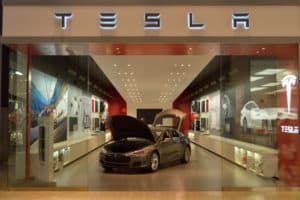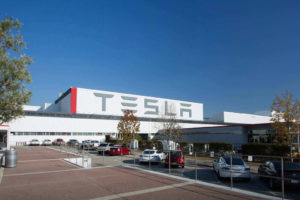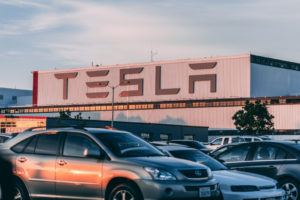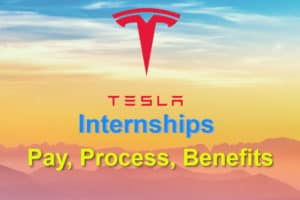This article is engineer-focused. While there is some good information for other job positions, future Tesla engineers will find this article useful the most.
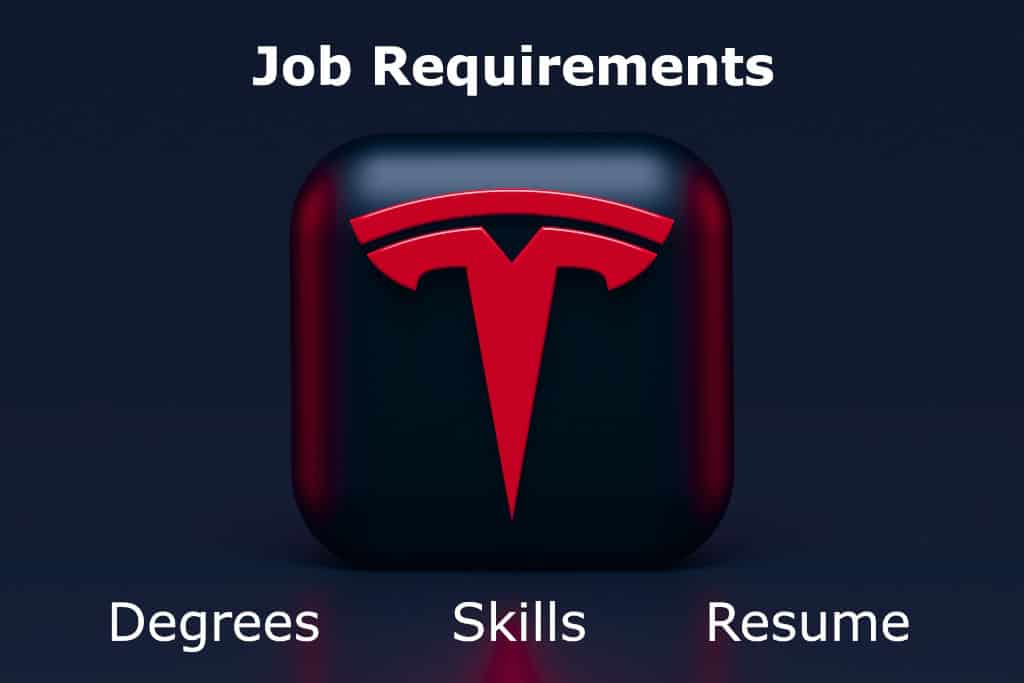
Tesla is the fastest-growing car manufacturer in the world, with a market cap going through the roof. With that in mind, getting a job there at this moment can seem like a really good opportunity, income-wise.
We’ve looked at the experience of many current and former Tesla employees, as well as Tesla’s own guidelines to bring you the current information on what degrees, skills, and experiences are needed for a typical Tesla job, such as an engineer.
At the start, there are no special requirements to apply at Tesla. The only requirements for potential Tesla employees include:
- having a high school degree, and
- being over 18 years of age.
While many jobs at Tesla don’t have a college degree listed as a requirement, that doesn’t mean it isn’t there. College graduates will be the first to be looked at, and unless you’re an awesome engineer, it’s almost impossible to get selected without a degree, or without exceptional skills with relevant work experience. But, there are jobs many get without any special requirements.
What Qualifications Do You Need to Work at Tesla?
Generally speaking, most Tesla candidates don’t need to have decades of experience with a college degree. You can get a job at Tesla by having the relevant experience for the job at hand and being innovative in what you do.
There are a lot of engineering departments at Tesla: Hardware, Mechanical, Electrical, Software, Systems… For each of these, and depending on the team you’re looking to join, various qualifications may apply. Without going into each one separately, let’s look at some of the common ones.
For a Tesla engineer, the qualifications typically include:
- relevant experience in the field on as many projects as possible
- skills in engineer-friendly coding languages such as C and MATLAB
- a relevant degree, such as in mechanical engineering
- Showing off future potential and determination
- be able to deal with ambiguity and not knowing
Tesla hires a lot of engineers, from all areas and fields. Therefore, they will mostly prefer an engineering degree of any kind, and with as many skills as possible so that if you get rejected for one team, you still have a chance in another.
Many Tesla recruiters like the versatility of skills in an applicant. This broad range of skills, whether relevant to the job you’re applying for or not, is a big plus as recruiters now have the option to put you in different teams. It also shows your potential, and the ability to learn and grow.
Can You Get a Job at Tesla Without a Degree, and What Jobs Can You Get?
Tesla doesn’t formally require a degree for all job positions, but if you don’t have a degree you do need to have a lot of relevant experience. If you’re looking for an engineering job without a degree, you really need to show some exceptional experience and skills under your belt.
Musk himself has stated that he doesn’t care if you have a college degree:
While it’s nice to hear that Tesla CEO doesn’t care about you finishing college, his HR team might think differently. While you may get considered even without a degree, it is well known among engineering students that Tesla will usually look at graduates first, and then at everyone else. It may not be true everywhere, but you should expect a tough time getting through.
Even though it may be almost impossible to get an engineering role at Tesla without a degree, you may still get a job as:
However, even when applying for these roles, you need to stand out to be considered. Other than being a factory worker such as a production associate, you need to have done a lot of projects behind you, for any of the engineering roles or equivalent.
Therefore, you need a lot of useful skills under your belt. You might need to know what those skills are so you can study and gain those, and how to craft your resume to maximize your chances of getting a Tesla job. We discuss this further below.
Do You Need to Have Experience to Work at Tesla?
This question is typically asked by university students and graduates, who don’t have any formal experience but may have done some projects or even an internship. If that’s the case, you have a chance at Tesla. However, you still need to be in a relevant field and have done some relevant projects.
Doing anything unrelated to the job position may also help. Not everything has to be related to the job you’re applying for, especially for graduates. Showing some imagination, creativity, and determination can help you out here. However, some experience must be there, at least in an adjacent field that may be of some use.
As you gain experience, make sure to take pictures of every project you do, and try to finish these projects and make the product/service a success. This is a big plus and recruiters love to see pictures of finished (or partly finished) products from potential candidates.
If you’re a high-school student, or just trying to figure out what you need to study to someday join Tesla, think carefully. A good piece of advice is to not try to build your career off of working for one company. A better approach is to figure out what your passion is, and if it’s a good match with Tesla, then go for it.
Which Skills Are Needed for Tesla Engineering Role?
The skills Tesla is looking for will depend on the position you’re applying for. For Tesla engineers, the number of skills and knowledge can be vast, but there are some common skills Tesla prefers to see in an engineer.
Depending on their field, a lot of Tesla engineers have these skills in common:
- Skills in designing mechanical/electrical systems
- Skills in MATLAB, LabView, CAD, AutoCAD, C++, SolidWorks
- Mechanical skills such as welding, soldering, molding, laser cutting
- Skills in field testing, stress testing, tolerance analysis, etc.
- Skills in robotics, using power tools, prototyping
- problem-solving skills, analysis, and dealing with design issues
- innovation skills to be able to think of new solutions
- teamwork and the ability to fail and learn from mistakes
These are the skills that will make you stand out in a Tesla interview, as well as during the Tesla application process. There are hundreds of different skills you can obtain as an engineer, from design to manufacturing to testing, and dozens of software you can get familiar with during such a process. The way to get familiar with these is to just build stuff, while seeking interesting projects.
For university students and recent graduates, consider doing some research on Tesla as a company. Not just about Tesla cars or Elon Musk, but on problems Tesla is trying to solve. Additionally, prepare and have a good answer to “Why Tesla?”. This way you can show some interest and enthusiasm.
Cindy Nicola, previous head of global recruiting at Tesla, shared some of the soft skills that are essential for Tesla:
- being innovative
- being driven and passionate
- being a team player
The reasoning behind these three soft skills is that they are looking for someone with potential, who can solve tough problems while dealing with ambiguity.
Tesla is looking for people who can experiment, test, and learn from their mistakes. Their HR says that “failure is OK, but you should fail fast, and be flexible and adaptable”. You don’t need to drive a Tesla to work at Tesla. You need to be a builder or have a builder mindset.
What Does Tesla Look For in a Resume of an Engineer?
Tesla will first look for any experience relevant to the job position, therefore your resume should have keywords that match the job description.
For a typical mechanical engineering position, Tesla is looking for:
- Experience in designing mechanical systems
- Skills in modeling software, such as AutoCAD
- Mechanical experience in 3D printing, laser cutting, welding, etc.
- Skills in engineer-friendly coding languages such as LabView, C++, and MATLAB
- A degree in mechanical engineering or a relevant field
- Experience in stress and data analysis via different kinds of software
These are just some of the skills that can get an attention of a recruiter.
Here’s an example of an engineering resume that landed a job at Tesla:
A good rule that many resumes apply these days is to quantify your accomplishments, and instead of saying something vague you actually mention the measurable and specific change you did, by using numbers and percentages. Therefore, quantifying your accomplishments may be impactful.
Your resume also needs to be easily scannable, and readable. You don’t want to clutter or add too much with icons or similar, but instead, make it quickly digestible by a recruiter. Your hiring manager needs to be able to know you’re a good fit for the job, in just 8 seconds after looking at your resume.
For recent graduates or university students, who don’t have a lot of experience to share on their resume, you might want to consider:
- expanding your extracurricular section
- adding an additional page on a resume
First, Tesla HR suggests paying close attention to your extracurricular section on the resume. Add any projects you’ve done, volunteering, or working outside of school. It doesn’t matter if it’s not work-related, they would like to get to know you as a person and understand your passions and interests better. This can show off your potential, as well as determination or a sense of responsibility if you’ve been working after school, for example.
While having a one-page resume looks nice, having an additional page might be helpful for recent graduates by showing various skills, experiences, and interests. In this case, you can have your 2nd-page act as a supplement page and a conversation starter by listing your interests, personal projects you have worked on, and skills you learned by working on them.
While some Tesla recruiters advise sticking to one page, it might be worth the risk if you have a lot of personal projects to share and talk about. Try to remove the fluff though, and stick to specifics. Good luck!


